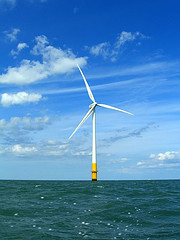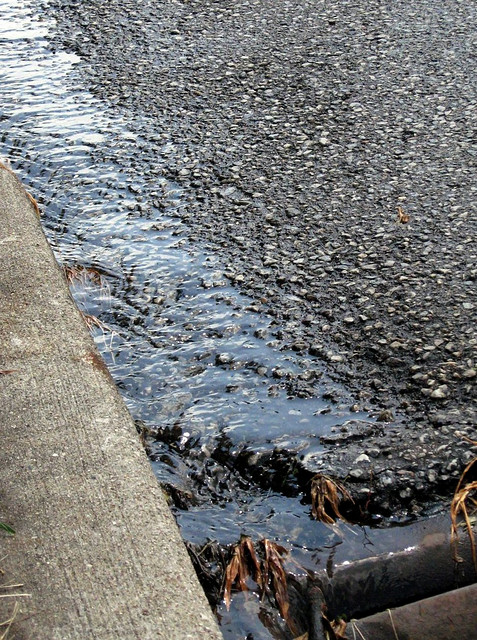General Assembly environmental scores slip in 2013
By Meg Tully
Ratings on environmental policy for Maryland legislators slipped last year, despite passage of a major offshore wind energy bill championed by Gov. Martin O’Malley.
The Maryland League of Conservation Voters released its 2013 scorecard Monday, giving lawmakers an average score of 64% in the House of Delegates and 55% in the Senate. Those scores are down slightly from last year’s 69% in the House and 63% in the Senate.
In the Senate, Republicans scored an average of 12% compared to Democrats’ 70%, and Republicans scored 26% in the House compared to Democrats’ 81%.
But environmental leaders in the General Assembly said the overall lower ratings weren’t due to a bad year for environmentalists — it just wasn’t as great as recent years.
“We had a few big years in a row,” said Sen. Brian Frosh, a Montgomery County Democrat who sponsored two of the bills included in the league’s scorecard and earned a 100% rating in 2013. “This General Assembly has had a really good record overall.”
One of his bills highlighted in the scorecard — a ban on possessing shark fins — passed and was signed into law. Sponsored in the House by Del. Eric Luedtke, another Montgomery Democrat, the bill is intended to prevent overfishing of sharks, but it does allow some shark fishing licenses to be given out by the state. Frosh’s other bill, to introduce a bottle deposit return system in Maryland, did not pass. But he is optimistic about its chances next year.
League: decline should be a wake-up call
Karla Raettig, executive director of the league, said the organization is hopeful the decline in scores will be a wake-up call.
Some major issues on the scorecard were: a successful move to raise the gas tax and fund more mass transit projects, a proposed change to stop companies from earning renewable energy tax credits for paper waste by-products known as “black liquor,” offshore wind energy, unsuccessful attempts at hydraulic fracking limitations, and votes related to delaying a new stormwater management fee dubbed the “rain tax.”
“We’re hopeful people will get the scorecard and let their legislator know that they want them to come back in 2014 and make the environment a priority,” Raettig said.
For the first time, the league is offering a high-tech version of the scorecard where citizens can check on the lawmakers from their districts and then share the results on Facebook and Twitter.
The new techonology will shift the scorecard from being an educational tool to a way to truly hold lawmakers publicly accountable, she said.
Republicans had overall lower scores
Del. Kelly Schulz, one of 15 Republicans who scored zero in the LCV 2013 scorecard, said she hadn’t seen any social media posts as a result of the scorecard. But she said that she didn’t think her constituents in Frederick County would be shocked by any of her votes.
“I don’t look at the scorecards very often,” Schulz said. “I place my votes and they are public record to everybody – how they tally up with one special interest group, that’s not really my main concern.”
A member of the House Economic Matters Committee that considered wind power, Schulz was an outspoken opponent.
“That is just a really bad bill for taxpayers, and it has not even been proven that offshore wind will be effective for the state of Maryland,” said Schulz, who asked for a cost-benefit analysis of wind energy compared to other types of energy.
The wind energy bill, the gas tax and the vote on delaying implementation of the stormwater fees all involved increased charges, taxes or fees for consumers and businesses.
Nearly 40 General Assembly members had perfect scores
Nine members of the Senate and 28 members of the House of Delegates scored ratings of 100%.
Sen. Jim Rosapepe, a Democrat who represents Prince George’s and Anne Arundel counties, was among those with a perfect score. He said the ratings can be helpful because a lot of people are busy working and raising families.
But his constituents care about the environment, he said. He was particularly proud of the gas tax increase because it will increase funding for the Purple metro line and Marc train service.
“I’m very committed to making the decisions we need to make to clean up the Chesapeake Bay, promote renewable energy and to keep our air and water clean,” he said.
Sen. Paul Pinsky , a Prince George’s County Democrat who scored 100% in 2013, said he was most proud of his sustained record on the environment. He has served for 27 years and has a 99% lifelong rating.
In 2012, the General Assembly approved a major septic bill that will limit development in rural areas. But 2013 brought big changes in gun control, the death penalty and other social and economic issues, in addition to environmental policy.
“We’re making steps forward, there is no question about it,” he said.

MarylandReporter.com is a daily news website produced by journalists committed to making state government as open, transparent, accountable and responsive as possible – in deed, not just in promise. We believe the people who pay for this government are entitled to have their money spent in an efficient and effective way, and that they are entitled to keep as much of their hard-earned dollars as they possibly can.



